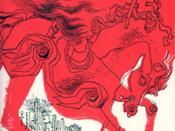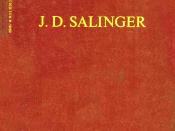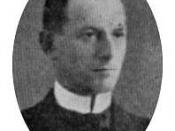Module Number: SE2386 Student Number: 970070357 The Rise of the Teenager and The Catcher in the Rye.
Adolescence has long been depicted as perhaps the most emotionally painful phase of human existence. Occupying an age of marginality between child and adulthood, teenagers stand on the edge of appropriating full adult subjectivity, yet are often unwilling or unable to assume the responsibilities and consequences accompany this social repositioning. The materialization of the teenager as a cultural entity is traceable to 1950s America: with its explosion of dangerous rock'n'roll music, fast cars, an unprecedented fashion consciousness and an 'exemplary consumer culture,' the fifties first demarcated teenagers as a distinct economic and social category. Hereafter constructed as a site of potential social dislocation, teens characteristically reject institutions such as school, religion, government and the family in an attempted affirmation of their newfound, though as yet unauthorized autonomy. Historical and ideological factors interact essentially within modern American literature, where the struggle between teens and dominant authority represents an interrogation of established, though by no means incontestable social values.
This interrogation of values is culturally attributable to the Second World War, the end of innocence for the US. Signifying an engagement in 'bloodied modern history,' America nonetheless emerged from the war as the first military and economic superpower, a 'land of unprecedented affluence' whose teenagers enjoyed substantial disposable incomes; a direct result of capita per head of population being twice that of the UK, five times that of France and a massive seven times that of the US's rival monolith, the USSR. However, the capitalist individualism readily embraced by the US was far from a simple political ideology. The primary significance assigned to money and consumerism integrates dubiously into a culture supposedly upholding authentic morality in the face of the demonised and invisible, yet omnipresent Communism of the USSR. In The Catcher in the Rye, J. D. Salinger's seminal teen novel, the seventeen year old narrator Holden Caulfield searches for innate authenticity, evaporating in the face of a society revolving around money, image and sexuality while attempting to reaffirm defunct childhood values in an adult world corrupted by 'phonies' and 'perverts.' Catcher repeatedly valorises the world of childhood as one of innocence, security and sincerity, free from rapacious mercantilism; a world Holden has left physically but not mentally as he struggles to integrate into the sphere of adult experience.
Throughout the novel, Holden's encounters with children create a world of stability and purity. In chapter sixteen, whilst waiting for Sally Hayes, he meets a girl 'sitting on a bench all by herself, tightening her skate' (p.107). Holden helps her, and despite his proclamation of, 'boy, I hadn't had a skate key in my hand for years,'(p.107) he remembers how to use one, as indeed he would 'fifty years from now' (p.107). For Holden, childhood represents a perpetual present where things remain unchanged, unblemished by time or adulthood. Everything in the Museum of Natural History 'always stayed right where it was,' (p.109) and change is calculated by a simple signifier- your overcoat, your partner, or a puddle you walked by- not by the passing of years, the end of wars, the changing of government, or other adult signifiers. Children and their bubble of insular experience are invariably depicted as 'polite' throughout the novel, consistently pitted against the 'bums, perverts and phonies' of adulthood, and a clear value judgment transpires: kids are real, adults are not.
However, the driving tension of the novel is precipitated by Holden's palpable desire to integrate into this corrupt, phony world of adulthood. Many critics read Holden's withdrawal from adult society as a failure of that society, yet Holden essentially wants to connect with it. The apparently simple dichotomy of child/adult is deconstructed by his co-existent desires to be both: he smokes, he swears, he stays up all night and constantly tries to buy alcohol in an dual attempt to rebel and procure adult knowledge, yet simultaneously cherishes the childlike sincerity of tightening skates. His fascination with age and its consequences is demonstrated throughout: he is only seventeen, yet six foot two, and professes to have grey hair. This should allow him to illegitimately buy alcohol, yet when he asks for a 'scotch and soda' (p.62)- a sophisticated drink in Holden's view- he is humiliated and asked for some verification of his age. Ten lines later, he repeats 'I'm a goddam minor,' (p.63) as he despondently realises adult subjectivity is not yet his to assume. Indeed, the passage from child to adult can be read as a passage from object to subject, social silence to speech, worldly innocence to experience; Holden's narrative marking the struggle of a teenager discovering a space from which to speak and accept liberal autonomy. Holden consciously constructs himself as not a child, and aspires to be 'suave' at any opportunity- with girls, in a bar, with friends, in his speech. Although he professes to despise counterfeit appearance over authentic substance, Holden's main pursuit in his few days after leaving Pencey is to command this sophisticated, adult image, and imbue it with authentic and inherently childlike sincerity.
Perhaps the most obvious signifier of the maturity Holden craves is sexual experience, the consummate initiatory act of adulthood. Holden's preoccupation with sex and his 'inability to relate to females' both exacerbate his distressed mental state, since his sexual encounters repeatedly leave still him searching for the emotive affirmation supposedly located in sex, that which 'fascinates and threatens, lures and depresses.' Jane Gallagher, Holden's old girlfriend, is little more than a childhood infatuation, and their sexual contact extends no further than holding hands. Although they only nearly kissed once, Holden asserts, 'you don't have to get too sexy to get to know a girl,' (p.69) and that he knew Jane 'quite intimately' (p.69). Prevented from forming fully sexualised adult relationships by his inherent childish inhibitions, Holden repeatedly divulges how he is 'quite sexy,' (48) but simultaneously a virgin. On initially entering his hotel room, Holden just looks across his to the other side of the hotel and sees a man cross-dressing and a couple indulging in alcoholic foreplay. Whilst he denigrates the hotel as 'lousy with perverts,' (p.55) Holden is nevertheless fascinated by the 'junk' he witnesses. Indeed, the hotel window exists as a metaphor; one affording Holden a precursory insight into adulthood and sexual maturity. He even attempts to interface with this world and hires a prostitute. In reconfiguring women as negotiable commodities and using Sunny, Holden attempts to bypass the emotional bonds necessary for maturity by buying his way into adulthood. His unequivocal childish nervousness and a fundamental refusal to be drawn into a world where emotional attachment is exchanged for mercantile pleasure, however, prevent him from transcending his adolescent categorisation. Whilst the seedy, sexy world of the hotel may indeed evolve to be the only authenticity available for the teenage Holden, its lack of moral substance leaves him still trying to distinguish the difference between purity and sleaze, childhood and maturity.
Identifying the disparity between image and substance, exterior and interior is not, however, a task exclusive to Holden Caulfield. Significantly, the political climate of post war, fifties America was one of analogous frenzied detection, as a prevalent 'fear of [Communist] subversion' permeated state systems. 'Extreme measures' were implemented in an attempt to establish (implicitly American) authenticity, and a turbulent culture of containment seized the country. Televised Communist witchhunts were commonplace, and the House of Un-American Activities Committee's (HUAC) infamous 'Hollywood and academic purges' typified the fear of internal social inversion. Replacing Nazism as the greatest evil on earth, Communism clashed ideologically with capitalism, and rooting out its agents posing as genuine US citizens by 'uncovering [their] duplicity was the theme of the day.' This historical specificity interacts fundamentally with a psychological reading of the novel, since Holden's search for realism assumes a wider social significance. Phoniness is now multiple: not only adult, but Communist other, and realness now American, not just childlike. His teenage status and American nationality thus construct Holden as a figure of complex plurality. At once both subversive to middle-class values and subverted by potential Communism, his teenage rebellion threatens to destabilize established values of dominant, bourgeois culture, whilst his red-hunting hat, loaded with visual significance, is a 'people shooting hat,' (p.19) an emblem of Holden's quest on behalf of that same threatened culture to uncover ubiquitous Communist phonies, bums and perverts. This hunt for invisible phoniness manifests itself recurrently in Holden's speech. Demonstrating an evident truth claim, his narrative is punctuated by phrases such as 'if you really want to know the truth,' 'I'm not kidding,' and 'I swear to God.' The complex ideology of containment culture is expressed, perhaps subconsciously, in the very words, codes and linguistic systems that constitute the text, and although keen to demarcate himself as a source of validity, Holden and his colloquial teenage slang are nevertheless paradoxically inscribed in this ambivalent system where phoniness is not only inescapable but self-engulfing. Often displaying 'virtually no self-awareness,' Holden too is a phony, and although he attempts to incorporate this into valid authenticity by claiming to be 'the most terrific liar you ever saw in your life,' his inclinations for role-playing, assuming pseudonyms and lying problematise his unearthing of dissident activities. Seemingly unaware of this self-incrimination, Holden is driven from space to space in search of realness, yet is relentlessly faced with an incongruity between image and substance: D.B is a 'prostitute' (p.1) out in Hollywood; in Pencey; Stradlater's attractive appearance is legitimised by secret slovenliness and a rusty razor 'full of lather and hairs and crap' (p.23); the bald hotel bellboy combs his hair over 'to cover up the baldness' (p.55); Sunny's youthful looks mask a sexually cognisant hooker. The only place to which Holden can trace authenticity is childhood. But he has repudiated childhood innocence for cynical teenage rebellion, and since he cannot assume full adult subjectivity, Holden is forced to internalise the crisis of authentication that circumscribes the novel.
Ultimately, the abstract 'truth' that Holden craves is unattainable in his immediate culture, and it is the internalisation of this painful conclusion that occasions his mental breakdown. Unable to fully reimmerse himself in lost childhood values, Holden's residual childish fears and apprehensions prevent his full incorporation into adulthood. Catcher, however, generates multiple discourses, and Holden's depression lends itself to culturally dependent as well as psychological interpretation. In a culture of containment, some values of which Holden has partially absorbed, the neater the social compartmentalization, the better, and a fear of counterfeit subversion evidently permeates his narrative. By constructing himself as a source of authenticity, incessantly naming acquaintances and casting frequent value judgements, Holden ultimately surpasses any genuine truth claim. His gestures become increasingly performative and the eventual self-realisation that innumerable names will never suffice pushes him to psychological meltdown. Even though sanity may be nothing other than 'conformity to a set of norms,' Holden's reluctance or incapacity to adhere to these norms eventually alienates him totally from the world that essentially, he would love to belong to.





